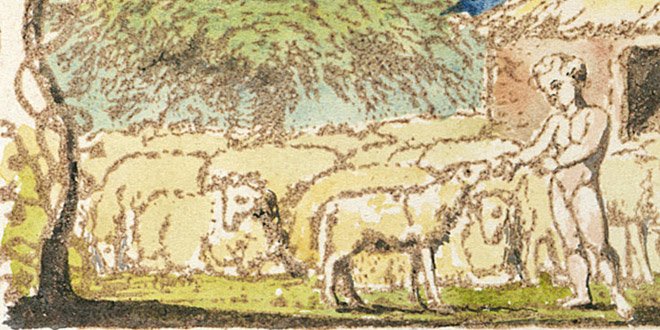So, your silly English teacher wants you to learn poetry, huh? Let’s be honest, you might be more interested in sonnets and sestinas if these poets were more liberal with their Xs and Os. Considering they’re not, and many of the ones you’re assigned are long dead and unable to adapt their work for you, perhaps there is another way to appreciate the wordsmiths?
Let’s take William Blake’s “The Lamb” as an example. It’s a poem commonly taught in high school and the introductory level in college. It hails from Blake’s Songs of Innocence, a book of poetry that is the companion piece to his Songs of Experience. The commonly accepted interpretation is that the poem is about God, as explained to a lamb by a little boy. Here’s the poem.
The Lamb
By William Blake
Little Lamb, who made thee?
Dost thou know who made thee?
Gave thee life, and bid thee feed
By the stream and o’er the mead;
Gave thee clothing of delight,
Softest clothing, woolly, bright;
Gave thee such a tender voice,
Making all the vales rejoice?
Little Lamb, who made thee?
Dost thou know who made thee?
Little Lamb, I’ll tell thee,
Little Lamb, I’ll tell thee:
He is called by thy name,
For he calls himself a Lamb.
He is meek, and he is mild;
He became a little child.
I a child, and thou a lamb.
We are called by his name.
Little Lamb, God bless thee!
Little Lamb, God bless thee!
Make sense? No, probably not, or you wouldn’t be reading this article. So let’s do a few substitutions (you know, like when your fullback gets hurt). While one cannot assume the person who wrote the poem is the same person speaking (think of this like the quarterback delivering the orders of the coach), for our simplified take let’s make the author of our poem coach Mike Ditka. Coach Ditka was head coach of the Chicago Bears for eleven years, won a Super Bowl, and is in the Hall of Fame.
Coach Ditka is writing a poem to the Vince Lombardi Trophy he once held high as Super Bowl champ. He’s trying to explain to it where its esteemed name originates. The trophy that the Super Bowl champs hoist up each year is named for Vince Lombardi, the former head coach of the Green Bay Packers. Lombardi is notable for winning five league championships in seven years, including the first two Super Bowls. He is often credited as the greatest professional football coach of all time. Here’s our revised version of “The Lamb”.
The Trophy
By Mike Ditka
Lombardi Trophy, who won thee?
Dost thou know who named thee?
Gave thee life, and bid thee heed
In the stadium and o’er the mead;
Gave thee luster of delight,
Winning shine, gleaming, bright;
Gave thee such a tender hoist,
Making all the players rejoice?
Lombardi Trophy, who won thee?
Dost thou know who named thee?
Lombardi Trophy, I’ll tell thee,
Lombardi Trophy, I’ll tell thee:
He is called by thy name,
For he called himself a Coach.
He was bold, and a gamer;
He became a hall-o’famer.
Thou a trophy, and I a coach.
We are called by his name.
Lombardi Trophy, God bless thee!
Lombardi Trophy, God bless thee!
Make more sense? “Mead” is simply another word for “field,” such as a football field. Otherwise, fairly clear, huh? Poetry isn’t hard. It simply has a fairly high bar set for entry. Once you approach it from another direction, then it becomes much clearer.

